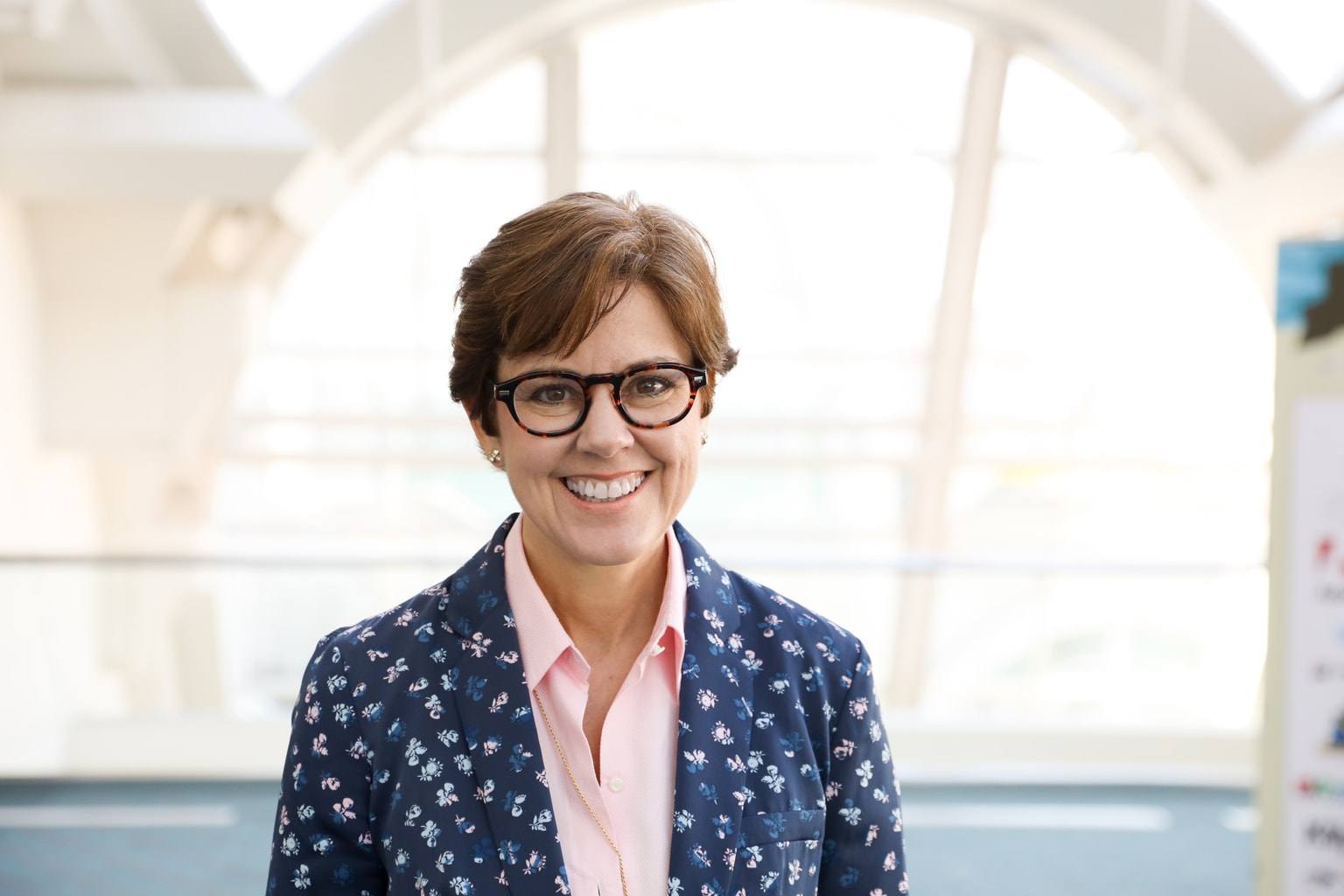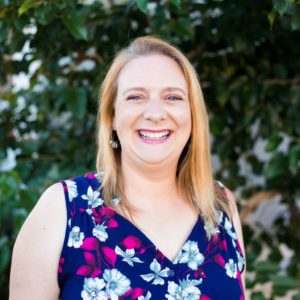
If you ever have the supreme pleasure of a long, winding afternoon phone call with Ann Handley, run to the phone.
I’ve admired Ann as a writer, speaker and business owner for a long time, and one of my favorite marketing conferences is the one her company, MarketingProfs, puts on every fall: B2B Marketing Forum.
I caught up with Ann, planning to ask her about her writing process and what’s new in her world. Our conversation was inspiring, and I hope it’s helpful to all aspiring and striving writers and editors reading this. We talked about the importance of continuous learning and experimenting to keep your work fresh for you and your readers, why mentoring matters, and how she learned to “poke her nose out” and stop asking for permission.
A lot of people associate you with MarketingProfs, but you launched a newsletter this year under your personal brand. Tell me about the differences between MarketingProfs Ann and Regular Ann.
You make me sound like a brand extension… I should develop “Ann Lite” or “Ann Zero” in addition to “Regular Ann.” (LOL)
MarketingProfs is in the business of teaching marketers what we need to know to be successful in our careers, in our jobs, in ours lives. I am a partner there, but my personal expertise and interest is more specifically around writing, content, the value of clear communication, and how you can level-up your career.
Reading and writing is really what I love to do both in my personal life as well as in my professional life. I decided to focus solely on that. With a little bit of quirk … because, you know, I’m sort of a quirky person. (Aren’t we all?)
Why did you choose email?
The story is that a subscriber, Ben Opsahl, sent me an email and said, “Why don’t I hear from you? I’ve only heard from you four times in the past year.” Then he and I started chatting back and forth, and I started to feel like I knew him, even though we’ve never met.
And that’s when it hit me: I was missing that connection.
I believe that email is the most powerful way to have that kind of one-on-one communication. Someone is inviting you into their inbox, and that’s almost become a cliché in marketing, but it is incredibly powerful. I believe that email is absolutely the most magical channel that we have, short of face-to-face. And maybe more powerful than face-to-face for word people like me.
I believe that talking directly to somebody via email is a privilege. It’s an honor to be invited into their inbox. And it’s awesome: It’s fun. It’s intimate.
Folks can opt out and unsubscribe so easily that it holds us, as marketers and as writers, to a higher bar. I wish more companies respected their email that way. The world would be a better place, you know?
(Ed note: You know you can’t resist signing up for this newsletter now.)
You’ve written two books in the past few years. Tell us about your writing process.
I’m a terrible procrastinator. I’m not the world’s best anything, but I will challenge anybody who thinks they’re a better procrastinator than I am … because I’m world-class.
For me the key is to commit to an editorial calendar. And the only way that I can do that is to live constantly be in that “leaning-forward” mode.
The squirrel is the spirit animal of writers everywhere, because the squirrel is constantly gathering nuts and food and useful things … and then literally squirreling them away for a different day. He’s a scatter-hoarder.
A writer is very similar. We are scatter-hoarders.
I see something and I think, “Oh, I might be able to use that.” Even if I don’t know exactly where I’m going to use it or what my take on it is going to be … I squirrel it away for another day. I hoard these ideas, and I’ve scattered them all over the place.
Some of them are stored online. I use a tool called Pocket. I also use a simple Moleskine notebook where I keep a running list of ideas. Both stupid-simple efforts. But simple works.
Ideas are necessary but commitment is better: I know that my newsletter is going to go out on Sundays, and that’s going to be the plan every two weeks, so I just set a deadline for myself and I adhere to it.
As much as I say that I’m the world’s best procrastinator, I also have a pretty strong work ethic, so that’s ultimately what saves me from being homeless and living out of my car.
Do you listen to music while you write?
I don’t, no. It has to be completely silent, and that’s why I built my tiny house in my backyard.
I call it the tiny house, although it’s technically not a house (there is no plumbing). It’s my space where I go to write pretty much year-round, except for January and February, because it’s just a little nippy. Last week we had us a couple of 60-degree days in Boston and that was lovely, mostly because I got to trek out to my tiny house!
View this post on InstagramA post shared by Ann Handley (@annhandley) on
It’s a sacred space. That sense of having a place is really important to me as a writer.
One thing that can be tough for writers as they become editors and even consultants is keeping a consistent voice. How have you nailed down voice over the years? When you’re writing for MarketingProfs, do you have a different voice than when you’re writing for your own brand?
You know, I never assume another voice when I’m writing. I’m always writing as me, although it’s a sliding scale of tone. On my personal blog, I may be a little looser and fun. On MarketingProfs, I tend to be a little bit more … I don’t know, a little less quirky, I guess. On MarketingProfs, people may not know me as well as they do on my personal site.
Imagine you’re having a conversation with somebody you bumped into in the grocery store aisle. You don’t know them very well. You’re aware that others in the Produce section are within earshot, listening in as they pick over the grapes. You’re not going to communicate in the same way as if you’re in your living room having a conversation with a good friend and a glass of wine. So my voice is the same, but tone changes. In this case, the intimacy of my tone will change.
My blog, my own site, is my living room with a glass of wine, and MarketingProfs is more standing in the middle of a grocery store.
I’m still the same person communicating in the same voice, but it’s just how I’m saying things is slightly moderated in tone, if that makes sense.
That’s a great metaphor. I’m stealing that. Beyond writing, I saw that you’ve been doing a lot of reading lately. What have you learned?
In 2017 I made a promise to myself — a resolution — to have more pages in my life and fewer screens. More Pages, Fewer Screens. I’m continuing MP, FS in 2018.
Last year was an incredibly productive year for me. I read more books than I had probably the previous two years combined. I had fallen into the habit, that we all do, of just opening up Facebook or Instagram and then scroll, scroll, scroll, and the next thing you know it’s three hours later and you’re feeling slightly depressed and restless and also like “What happened?!”
The political stuff last year just really made me realize I needed to change my habits a little bit. And so I did, and it’s been incredibly gratifying.
One benefit has been that when you’re reading, you’re igniting parts of yourself that you don’t ignite otherwise, and that spills over into all kinds of ways.
In other words, reading more has made me a more productive generally: I have more ideas. I’m more excited about things in general. I feel more positive. I’m more curious.
Is that because of more reading or is it because of less Facebook? I don’t know. All I know is that I feel better.
The more things I read, the more things I want to read.
There are so many moments where I find myself thinking about a book that I thought had nothing to do with work, or nothing to do with marketing or content. But in the end it often does.
(Ed note: Jump-start your 2018 reading list with Ann’s curated picks.)
What’s your advice for people who want to make a living as a writer?
Two things: First of all, read as much as you write because it’s important to continue to feed yourself — and that’s true, I think, whether you gravitate toward business books or toward fiction or whatever. Read read read. Read a wide array of lots of different things. (See my last answer!)
Second: Poke your nose out. As a younger professional I didn’t always do this, and it took me a really long time to get to where I wanted to be because half the time I waited to be invited.
“Poke your nose out” comes from when I was a teenager and learning how to drive. I remember being stuck at an intersection and trying to take a left across traffic. I was waiting, waiting, waiting, and my driving instructor — his name was Harry — finally growled at me, “Poke your nose out. No one’s going to invite you.”
So I did. I finally took that left turn and I finally passed my driver’s test and went to college and grew up. But I still think about that often, because it’s a great metaphor for waiting for other people to invite you to get where you want to go.
If you want to do something, you need to just do it. You need to make it happen. You need to figure out who you need to know to become a better writer, or where you need to write, and how to actually get there strategically.
If you want to write for The New Yorker someday, look at what those other New Yorker writers did. Follow that path. Reverse-engineer where your byline needs to appear first.
Or, if you want to be the chief content officer of your own company, or if you want to be the CEO, figure out who you need to know, what you need to do, and what steps you need to take to get there, but make it happen. Create a strategy. Map it out. Write it down.
Own that process and you make things happen … instead of waiting for things to happen to you.
How did you start to poke your nose out as a writer and a speaker?
I was a reluctant speaker. I never craved the stage limelight. In fact, I avoided it. Until my first book, “Content Rules,” came out in 2010, and I felt forced on stage.
Before that, I didn’t feel the need, and I didn’t think I had anything interesting to say. Then suddenly I went from being an author to having a book to sell and I was like, “Alright, well, I guess I’m in sales, so let’s do this …!” And now public speaking a big part of what I do and who I am. And I no longer avoid it.
I was wrong about part of that, by the way. I actually did have something interesting to say … I had a point of view, of course. As do we all.
Realize that you, too, actually do have something to say. You have to figure out how you want to package it. You have to figure out what you stand for.
It’s like when I wrote in my diary as a kid: “I want to be a writter, O.K.?…”
I saw that. That made me laugh. I was like, ‘Who are you asking for permission?’
Exactly! It’s guess it was baked into me as a child… which is annoying to me now LOL. Was I looking for validation? Did I need somebody to tell me that I was good enough to be a writer? Now-me is rolling my eyes at then-me.
That’s probably why the Poke Your Nose directive resonated with me. It’s taken me a lifetime to internalize that advice!
How do you help other people build their confidence?
I try to lead through example. There are a few women I have tucked under my wing. It’s not a formal program, but they are women who I try to promote and watch out for, because I know and love them and they’re smart people and they deserve to have a louder voice.
Second, stand for something. You’ve got to differentiate yourself from everybody else. What’s the thing that you stand for? What’s your story?
The thing that I stand for is quality in work: doing work you’re proud of … that feeds your soul. That’s the through line in everything that I’ve done.
You’ve got to figure out your story. Answer the question “What am I truly about?” not just “What do I do?”






